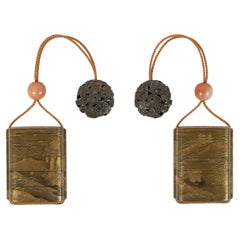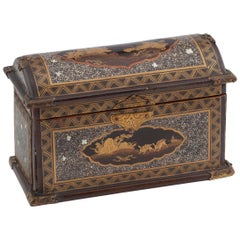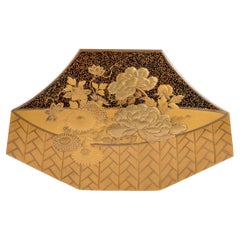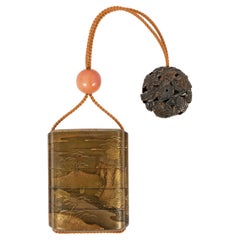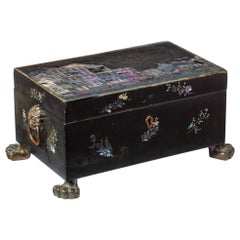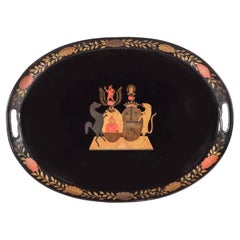Continental Europe - Lacquer
to
1
121
383
151
118
2
1
2
2
1
35
53
30
3
11
9
6
1
1
2
2
3
82
62
42
29
9
109
98
84
14
6
121
120
120
1
1
1
1
1
Item Ships From: Continental Europe
Gold Lacquer Inro Decorated with a Lake Landscape
Located in PARIS, FR
Inro with four gold lacquer boxes, decorated with a lake landscape. Accompanied by a bronze ryusa manju.
Small boxes formed of compartments that fit one on top of the other, inro (? ?) are traditional Japanese clothing...
Category
Mid-19th Century Antique Continental Europe - Lacquer
Materials
Lacquer
Unique 17th Century Miniature Japanese Namban Lacquer Miniature Dollhouse Chest
Located in Amsterdam, NL
A unique and exceptional Japanese miniature or dollhouse export lacquered chest
Kyoto, circa 1620-1640
The chest of rectangular shape with a domed lid, decorated in Transition-style, in gold hiramaki-e on a black background within reserved lobed cartouches decorated with landscapes animated with birds and rabbits, on a shagreen or samegawa background. The borders are decorated with geometric friezes, the box with gilt-copper mounts, the interior decorated in red lacquer.
Measures: H 9.2 x W 14.5 x D 7.2 cm
This miniature is of exceptional quality and a perfect copy of the famous large size Transition-style coffers. It was most likely ordered by a Dutch lady for her dollhouse (poppenhuis), like the famous Petronella Oortman (1656-1716) doll-house, which is now one of the highlights in the collection of the Rijksmuseum Amsterdam, or Petronella Oortmans-de la Court’s (1624-1707) dollhouse in the collection of the Centraal Museum Utrecht. Sara Rothé of Amsterdam in 1743 ordered a miniature black lacquered ivory tripod table with gold chinoiserie decoration by Jurriaan Buttner (Monika Kopplin, European Lacquer, 2010, p. 56).
Other Japanned dollhouse...
Category
17th Century Japanese Edo Antique Continental Europe - Lacquer
Materials
Shagreen, Cypress
Japanese peony basket lacquered box Edo
Located in PARIS, FR
Eight-sided, flared shaped lacquer kobako box, following the decoration on the lid depicting a basket of flowers, composed of peonies and chrysanthemums in gold takamaki-e and hirama...
Category
18th Century Japanese Edo Antique Continental Europe - Lacquer
Materials
Gold
Japanese inro of the edo period adorned with a landscape houses near a lake
Located in PARIS, FR
Inrō with four gold lacquer compartments, decorated with a lake landscape. Accompanied by a bronze ryusa manju.
Small boxes formed of compartments that fit one on top of the other, i...
Category
Late 18th Century Japanese Edo Antique Continental Europe - Lacquer
Materials
Gold
Japanese Nagasaki Export Lacquer Box with Depiction of the 'Trippenhuis'
Located in Amsterdam, NL
A Japanese Nagasaki export lacquer box with mother-of-pearl depiction of the Amsterdam ‘Trippenhuis’
Edo-period, circa 1830
H. 12.5 x W. 24...
Category
19th Century Japanese Edo Antique Continental Europe - Lacquer
Materials
Mother-of-Pearl, Lacquer
An oval Japanese export lacquer tray
Located in Amsterdam, NL
An oval Japanese export lacquer tray decorated with the alliance of the coats of arms of the Mooyaart and Pauw families
Edo-period, circa 1798
L. 51.5 x B. 37.5 x H.3.2 cm
This tra...
Category
18th Century Japanese Antique Continental Europe - Lacquer
Materials
Lacquer
Jewelry box, game box - lacquered wood - China - 19th century
Located in Beuzevillette, FR
Jewelry box, also serving as a game box, made of lacquered wood. It opens on the front with two drawers and a flap revealing a rectangular mirror and the play or storage area.
The d...
Category
Late 19th Century Chinese Qing Antique Continental Europe - Lacquer
Materials
Wood
Japan Red Lacquered Box 19th century
Located in Beuzevillette, FR
Beautiful Japanese box in red lacquered wood.
The lid is decorated with golden herons and flowering tree branches and signed by the artist. Black flowers are painted around the box.
...
Category
Late 19th Century Antique Continental Europe - Lacquer
Materials
Wood
Black and Gold Lacquer Suzuribako 'Writing Set'
Located in PARIS, FR
Black and gold lacquer suzuribako (writing set) in takamaki-e on a nashi-ji background representing two tigers near rocks, bamboos and plum blossoms in a night landscape. Inside of the lid with a lake landscape.
The interior of the suzuribako is composed with an inkstone, topped by a copper water bucket in the shape of a chrysanthemum on the left side, with a brush and a small knife. It includes in the right part a storage compartment.
Inscription under the inkstone "Inkstone made by Nakamura Chobe".
Although the tiger is not native to Japan, it has a high symbolic. The figure of courage was introduced by Buddhism from China. According to the Chinese tradition, the tiger is from one of the stars of the Great...
Category
Late 18th Century Japanese Antique Continental Europe - Lacquer
Materials
Lacquer
1800s Russian Lacquer Box Philosopher
Located in Vienna, AT
In this ad you get the chance to buy a beautiful hand-painted Russian lacquer box from the 1800s. It is cylindrical in shape, slightly curving in...
Category
18th Century Russian Antique Continental Europe - Lacquer
Materials
Bentwood
Japanese Kobako box in the form of a furoshiki present in gold and black lacquer
Located in PARIS, FR
Rectangular and flat lacquer Kobako (small box) representing a furoshiki knot seen from above. Fundame background, furoshiki in takamaki-e with floral pattern, inside the folds of th...
Category
Late 18th Century Japanese Edo Antique Continental Europe - Lacquer
Materials
Gold
Pair of Japanese Lacquer and Mother-of-Pearl Inlaid Knife Urns, circa 1800-1815
Located in Amsterdam, NL
A rare pair of Kyoto-Nagasaki style lacquer and mother-of-pearl inlaid knife urns
Edo period, early 19th century
Measures: Height 71 x diameter 30 cm
?Formed as urns with vertically lifting covers and elongated finials, revealing fitted green velvet lined interiors for knives, decorated overall with birds, flowering stems, faux-fluting and oval panels with landscapes. The square plinth is raised on four bracket feet. Inside the lifting cover of one of the urns are Japanese characters, supposedly indications of some code by the craftsman.
A closely related knife urn, now in the collection of the Peabody Essex Museum, Salem (inv. E 73115), was acquired in Nagasaki by Captain Samuel Gardner Derby of the Margareth of Salem in 1801. Captain Gardner Derby traded in Nagasaki under charter from the VOC (Vereenigde Oostindische Compagnie), the Dutch East India Company. Between 1797 and 1814 Holland was occupied by the French and from 1811 until 1816 Java by
the English. During these periods practically no Dutch shipping was possible between Holland and Batavia (Jakarta) or between Batavia (Jakarta) and Nagasaki. To maintain a minimum amount of shipping between Batavia (Jakarta) and Nagasaki, between 1797 and 1807, the VOC chartered mainly American ships. American captains and officers ordered and bought mainly lacquered furniture in an American-English style, completely different from what the Dutch up till then had ordered. The present knife urns were possibly also ordered and acquired by Captain Gardner Derby during his stay in Deshima/Nagasaki in 1801.
Another similarly neoclassical shaped knife urn in the collection of the Ashmolean Museum Oxford (inv. 1996.17) appears to be signed by woodworker Kiyotomo koreo tsukuru (Kiyomoto made this). The same name, together with an address in the Sanjo-Teramachi District of Kyoto, has been found inside a fragmentary urn in a private collection. This is an indication that European-style furniture was not only lacquered in Japan but made there as well. This undoubtedly is not only true for knife-urns, but all European- style furniture lacquered in Japan after circa 1800 was made by Japanese furniture makers...
Category
Early 19th Century Japanese Anglo-Japanese Antique Continental Europe - Lacquer
Materials
Brass
Japanese Antique Lacquer Natsume (box for matcha powder) Plum 'UME' 1980s
Located in Paris, FR
This is a box for the matcha powder using while tea ceremony in Japan.
It is called 'Natsume'. It is made with wood. The design is plums (Japanese apricot 'UME') and it is hand paint...
Category
1980s Japanese Showa Vintage Continental Europe - Lacquer
Materials
Wood, Lacquer
Japanese Lacquered Natsume 'Tea Box'
Located in PARIS, FR
Natsume in dark red lacquer, decorated with autumn leaves and cherry blossoms in hiramaki-e and nashiji. Interior in black lacquer.
Maple leaves (Momiji) are celebrated in literatur...
Category
Mid-20th Century Japanese Continental Europe - Lacquer
Materials
Lacquer
Japanese Lacquered Furoshiki Kobako 'Box'
Located in PARIS, FR
Rectangular and flat lacquer Kobako (small box) representing a furoshiki knot seen from above. Fundame background, furoshiki in takamaki-e with floral pattern, inside the folds of the fabric with black and gold sayagata pattern with togidashi maki-e technique. The saya (or sayagata) pattern is composed of Chinese swastikas...
Category
Late 19th Century Japanese Antique Continental Europe - Lacquer
Materials
Lacquer
Fabulous Lacquer Pagoda Chinoiserie Sculpture with Original Wooden Box
Located in Amsterdam, NL
Wajima lacquer model of a five story-pagoda by the contemporary lacquer master Miyasaki Masahiro.
In the original signed box, including a wooden disp...
Category
Late 20th Century Japanese Showa Continental Europe - Lacquer
Materials
Lacquer
Chinese Export Lacquered and Mother-of-Pearl Chess Board from 19th with a Table
By Gold China
Located in Madrid, ES
Chinese Export lacquered and mother-of-pearl chess board from 19th with a table carved wood stand.
Size: 58 x 58cm and 73 cm high
Very good condition.
Category
19th Century Chinese Chinese Export Antique Continental Europe - Lacquer
Materials
Wood
Japanese golden kobako flowers Edo period 18th century
Located in PARIS, FR
Quadrangular kobako box decorated with flowers in gold and blue lacquer with aogai inlay. Lid and sides in fundame lacquer, underside and interio...
Category
18th Century Japanese Japonisme Antique Continental Europe - Lacquer
Materials
Gold
Two Palembang Peranakan Lacquerware Bridal Boxes and a Tray
Located in Amsterdam, NL
Two Palembang Peranakan lacquerware bridal boxes and a tray
South Sumatra, Palembang, lacquer work by Chinese Peranakan artisans, mid 20th century
Woo...
Category
1950s Indonesian Vintage Continental Europe - Lacquer
Materials
Wood, Lacquer
Wakasa-Nuri Lacquer Bundai, Ryoshobako, Fubako Set
Located in PARIS, FR
Set of bundai, ryoshibako and fudebako in wakasa lacquer with an old rose background and black traditional Japanese patterns.
The saya pattern (or sayagata) is composed by Chinese svastikas. This symbol linked to Buddhism, mean intelligence, power and peace. It is a good omen sign.
The kanoko pattern reminds stains on fawn back.
The sakura (cherry blossom) pattern is emblematic of Japan. The blossoming in a short time marks spring beginning and is a symbol of renewal and ephemeral beauty.
There are also traces of calligraphy brush, in reference to the function of the objects.
Bundai is a low table used to put books or scrolls and, later, to write.
Rectangular ryoshibako (letter and document box) with a slightly domed
Fudebako (pencil case) of rectangular format very narrow in its length with two rounded corners, flat cover.
Wakasa lacquerware...
Category
Early 20th Century Japanese Continental Europe - Lacquer
Materials
Lacquer
Japanese Colonial Nagsaki Lacquer Box with Depiction of Amsterdam, 1830-1840
Located in Amsterdam, NL
An important Japanese lacquer box with a view of The 'Nieuwe Stadsherberg Van Amsterdam
Nagasaki, Edo-period, 1830-1840
The black lacquered wood box, decorated in gold and inla...
Category
Early 19th Century Japanese Antique Continental Europe - Lacquer
Materials
Mother-of-Pearl, Wood
Japanese Antique Lacquer Natsume (box for matcha powder) Automne Flowers 1980s
Located in Paris, FR
This is a box for the matcha powder using while tea ceremony in Japan.
It is called 'Natsume'. It is made with wood. The design is some automne flowers and it is all hand painted. Th...
Category
1980s Japanese Showa Vintage Continental Europe - Lacquer
Materials
Wood, Lacquer
Japanese Lacquered Box Decorated with Birds and Foliage, Signed, Late 19th
Located in Beuzevillette, FR
Japanese lacquered box decorated with birds and foliage
signed
Lacquered inside and outside
Late 19th Century
Without key
Some scratches and losses
Ideal for storing jewelry.
Category
Late 19th Century Japanese Antique Continental Europe - Lacquer
Materials
Wood
Lacquer inro, Japanese, Late 19th c.
Located in Stockholm, SE
A fourpart Japanese lacquer Inro. the lacquer is red with motives of a spider with its web in gold and two flying cranes. The lowest part of the inro has a crack on one side.
Category
Late 19th Century Japanese Antique Continental Europe - Lacquer
Materials
Lacquer
Japanese Antique Lacquer Natsume (box for matcha powder) Red Boat 1980s
Located in Paris, FR
This is a box for the matcha powder using while tea ceremony in Japan.
It is called 'Natsume'. It is made with wood. The design is a boat and it is hand painted. The material is with...
Category
1980s Japanese Showa Vintage Continental Europe - Lacquer
Materials
Wood, Lacquer
Fine 17th Century Japanese Export Black and Gold Lacquered Pictorial-Style Dish
Located in Amsterdam, NL
A fine Japanese export black and gold lacquered pictorial-style dish Nagasaki or Kyoto, 1680-1720
The dish with wide flat rim of Keaki wood (Zelkova species) in black lacquer with...
Category
17th Century Japanese Edo Antique Continental Europe - Lacquer
Materials
Gold
Japanese lacquer tebako 手箱 (box for personal accessories) with book design
Located in Amsterdam, NL
Superb rectangular black lacquer tebako (box for personal accessories) with a slightly domed well-fitted lid.
The lid has a continuous soft-tone multicoloured hiramaki-e (low-relief...
Category
Early 20th Century Japanese Continental Europe - Lacquer
Materials
Lacquer
Japanese lacquered 5-tiered jûbako 重箱 (picnic box) with banana leaf design
Located in Amsterdam, NL
Elegant lacquered tiered jûbako (picnic box) comprising five stackable tiers, two covers, and a raised tray. Each bearing an attractive deep chestnut brown ground and lacquered in ta...
Category
Early 20th Century Japanese Continental Europe - Lacquer
Materials
Giltwood, Lacquer
Chinoiserie Screen Art Deco Style in Colour China Red and Black Lacquer
Located in Hamburg, DE
Chinese Paravent, Art Deco style, China red lacker, main frame in black lacquer, base material wood, can be used as room divider as back side as a dec...
Category
1920s Chinese Art Deco Vintage Continental Europe - Lacquer
Materials
Wood
19th Century Red Lacquer Folding Chair China Round Back Chair
Located in Epfach, DE
The Chinese folding chair was made in the beginning of the 19th century. It is worked out very beautiful and the red lacquer is in a good conditi...
Category
Early 19th Century Chinese Antique Continental Europe - Lacquer
Materials
Leather, Wood
Small red lacquered Japanese box with royal motto of the Netherlands, 1880
Located in Beuzevillette, FR
Pretty little Japanese lacquered box.
On a golden metal medal inside we can read the royal motto of the Netherlands, adorned with a lion: "Je maintiendrai...
Category
Late 19th Century Japanese Antique Continental Europe - Lacquer
Materials
Wood
Japanese lacquer oblong storage box by Hiroshi Hayashi 林宏 (1967)
By Hiroshi Hayashi
Located in Amsterdam, NL
An exceptional, oblong lacquer 3-tiered storage box with cover, reminiscent of a bento box, by Hiroshi Hayashi (1967). Covered in shiny gold and black l...
Category
21st Century and Contemporary Japanese Continental Europe - Lacquer
Materials
Silk, Wood, Lacquer
Japanese 'double gourd' lacquer suzuri’bako (writing box) by Hara Yôyûsai 原羊遊斎
By Hara Yôyûsai
Located in Amsterdam, NL
An uniquely double-gourd-shaped lacquer suzuri’bako (writing box) with a design of gourd leaves, by Hara Yôyûsai (1769-1845).
Covered with amber coloured l...
Category
Early 19th Century Japanese Antique Continental Europe - Lacquer
Materials
Bronze
Japanese Ecru Lacquered Natsume 棗 'Tea Caddy' with Maki-E of Carriage Wheels
Located in Amsterdam, NL
Uncommon ecru lacquer tea caddy (natsume) with a nice golden hiramaki-e (low-relief design) of cart wheels submerged in a wild swirling stream.
The design ...
Category
20th Century Japanese Continental Europe - Lacquer
Materials
Giltwood, Lacquer
Japanese writting set in waqasa lacquer including bundai ryoshibako and fudebako
Located in PARIS, FR
Set of bundai, ryōshibako and fudebako in wakasa lacquer with an old rose background and black traditional Japanese patterns.
The saya pattern (or sayagata) is composed by Chinese svastikas. This symbol linked to Buddhism, mean intelligence, power and peace. It is a good omen sign.
The kanoko pattern reminds stains on fawn back.
The sakura (cherry blossom) pattern is emblematic of Japan. The blossoming in a short time marks spring beginning and is a symbol of renewal and ephemeral beauty.
There are also traces of calligraphy brush, in reference to the function of the objects.
Bundai is a low table used to put books or scrolls and, later, to write.
Rectangular ryōshibako (letter and document box) with a slightly domed
Fudebako (pencil case) of rectangular format very narrow in its length with two rounded corners, flat cover.
Wakasa lacquerware...
Category
Early 20th Century Japanese Taisho Continental Europe - Lacquer
Materials
Lacquer
Japanese suzuribako lacquered box peony river
Located in PARIS, FR
Suzuribako box (empty) in black lacquer. Gold maki-e decoration of a river bordered by peonies, one with red highlights. The edges of the lid are in gold lacquer. Nashi-ji interior.
Category
Late 19th Century Japanese Antique Continental Europe - Lacquer
Materials
Gold
Inro Dragon
Located in PARIS, FR
Beautifull inro of six compartments made of black gold, silver and tin lacquer,
representing a dragon on each side, surrounded by black and silver clouds, the inside
is made of nas...
Category
Early 19th Century Japanese Japonisme Antique Continental Europe - Lacquer
Materials
Lacquer
$11,882
Antique Vietnamese Lacquer Wrestlers Drummer Vase
Located in Munich, DE
Unusual lacquer vase depicting wrestlers in different poses and a drummer. The figures and banderoles are painted with gold, silver and black color onto the brown/red lacquer.
The va...
Category
21st Century and Contemporary Vietnamese Continental Europe - Lacquer
Materials
Lacquer
Pair of Early 19th Century Chinese 'Lazy Chairs' in Walnut and Black Lacquer
Located in Kastrup, DK
Pair of 'Lazy Chairs' in walnut, black lacquer with a natural cracked wear that gives the chairs an exciting and artistic look.
Ming style, early 19th century China.
The term 'Laz...
Category
19th Century Chinese Ming Antique Continental Europe - Lacquer
Materials
Walnut, Lacquer
Japanese Sagemono Inro box with a maki-e decor of a Samuari in a lake landscape
Located in PARIS, FR
Inrô in gilded lacquer according to the takamaki-e, hiramaki-e and kirigane techniques, with five squares of a mountain lake landscape.
On the first side, there is a man on horsebac...
Category
18th Century Japanese Edo Antique Continental Europe - Lacquer
Materials
Gold
Pair of Early 19th Century Chinese 'Lazy Chairs' in Walnut and Black Lacquer
Located in Kastrup, DK
Pair of 'Lazy Chairs' in walnut, black lacquer with a natural cracked wear that gives the chairs an exciting and artistic look.
Ming style, early 19th century China.
The term 'Lazy'...
Category
19th Century Chinese Ming Antique Continental Europe - Lacquer
Materials
Walnut, Lacquer
Antique Victorian Papier-mâché Wall Shelve with Edelweiss Decoration
Located in Berghuelen, DE
Antique Victorian Papier-Mâché wall shelve with Edelweiss Decoration
A rare antique Papier-Mâché corner shelve with hand painted alpine landscape and edelweiss decoration. Manufactu...
Category
Late 19th Century German Early Victorian Antique Continental Europe - Lacquer
Materials
Parchment Paper
A Papier-Mâché Lacquered Vase , Kashmir, 19th century
Located in PARIS, FR
Lacquered papier -maché vase ,Kashmir,19th c."
A baluster vase with a flared neck, in painted and lacquered papier-mâché, decorated in polychrome and gold with a complex and varied floral design.
Minor damage to the base.
Modern base
The papier-mâché technique was first adopted in Kashmir in the 14th century by Mir Sayyid Ali Hamadani, a Sufi mystic, who came to Kashmir during the late 14th century along with his followers, many of whom were craftsmen. These craftsmen used hand-made paper pulp from Iran.
Kashmir papier-mâché has been used to manufacture boxes (small and big), bowls, trays, étagères, useful and decorative items, models, birds and animals, vases, lights, corporate gifts...
Category
Mid-19th Century Indian Anglo-Indian Antique Continental Europe - Lacquer
Materials
Paper
Three Black Japanese Lacquer Nesting Boxes with Two Keys, Late 19th Century
Located in Beuzevillette, FR
Beautiful set of three black Japanese lacquer nesting boxes with their two keys.
Decorated with birds and orange, gold and green foliage.
The 3 boxes fit together.
The escutcheon ...
Category
Late 19th Century Japanese Antique Continental Europe - Lacquer
Materials
Wood
Bailly Théroux Late 19th Century Japanese Inspired Lacquered Side Table
Located in Beuzevillette, FR
Nice late 19th century Japanese inspired lacquered side table. The top is finely lacquered and in relief, it is made of Japanese inspired landscape, with birds, flowers and foliage, ...
Category
Late 19th Century Japonisme Antique Continental Europe - Lacquer
Materials
Wood
END OF THE 19th CENTURY PAIR OF JAPANESE VASES
Located in Firenze, FI
Beautiful pair of wooden vases lacquered in an elegant shade of blue, and decorated with light wood inlays and golden finishes. The inlays depict delicate floral and bird motifs, cre...
Category
Late 19th Century Japanese Meiji Antique Continental Europe - Lacquer
Materials
Wood
$2,994 / set
19th century Chinese Lacquered Elm Lunch Box, 1890s
Located in LEGNY, FR
Antique Chinese lunch box made of lacquered elm, dating from the 19th century, handmade. Used by rice paddy workers. Removable lid with a han...
Category
1890s Chinese Antique Continental Europe - Lacquer
Materials
Elm
Japanese fudebako or brush box in lacquered hardwood and ceramic inlay
Located in PARIS, FR
Brush box (fudebako) is made of wood and lacquer. On the lid, lacquer decoration representing sagittarius, a flower inlaid with ceramic and a leaf inlaid (raden).
Interior and base o...
Category
Early 20th Century Japanese Taisho Continental Europe - Lacquer
Materials
Gold
Edo Maki-e Japanese Box
Located in Brescia, IT
Japanese box with lacquer lid finely decorated with Maki-e, dating from the 18th century, mid-Edo period.
The box is of special size to preserve important calligraphy.
All sides of ...
Category
Late 18th Century Japanese Edo Antique Continental Europe - Lacquer
Materials
Gold Leaf
$3,089
Japanese Kogo or inecens box in the form of a realistic eggplant
Located in PARIS, FR
Small lacquered wooden box in the shape of an eggplant. Top of the fruit near the leaves painted with silver pigments. Interior painted with gold pigments, signature in the center pa...
Category
20th Century Japanese Showa Continental Europe - Lacquer
Materials
Silver
large lacquer plate
Located in VILLENEUVE-LÈS-AVIGNON, FR
Large wooden and red/gold lacquer plate
Edo Period (1603-1868) Japan
Category
Early 20th Century Japanese Edo Continental Europe - Lacquer
Materials
Wood, Lacquer
$2,079
Antique Japanese lidded bowl from the Meiji period, lacquer
Located in Hamburg, DE
This antique Japanese lidded bowl from the Meiji period, around 1900, is a stunning example of traditional lacquer craftsmanship, combining aesthe...
Category
Early 1900s Meiji Antique Continental Europe - Lacquer
Materials
Wood
Burmese Lacquered and Engraved Wooden Box
Located in Alessandria, Piemonte
Splendid and vintage Burmese Box, red lacquered and engraved, unusual size.
O/5307 -
Category
1930s Burmese Other Vintage Continental Europe - Lacquer
Materials
Wood
Large Japanese five part lacquer Inro, late 19th c.
Located in Stockholm, SE
A large five part lacquer inro. A family crest in gold on black background.
Category
Late 19th Century Japanese Antique Continental Europe - Lacquer
Materials
Lacquer
6-drawer cabinet of lacquer carved wood and steel from SoShiro Ainu collection
By SoShiro
Located in London, GB
The All Aid Wellness Cabinet from SoShiro’s Ainu collection, a collaboration between award-winning artist Toru Kaizawa and Shiro Muchiri, was initially imagined as a large-scale medi...
Category
2010s Japanese International Style Continental Europe - Lacquer
Materials
Stainless Steel
Small lacquered wooden sewing box
Located in Nivelles, BE
Small sewing box in lacquered wood with two different patterns on each side in red and black lacquer, the interior fleece is damaged.
Category
Late 19th Century Asian Napoleon III Antique Continental Europe - Lacquer
Materials
Wood
Japanese Black and Gold Lacquer Kushibako
Located in PARIS, FR
Kushibako (comb box) in black lacquer with gold lacquer decoration of arrows and my in the shape of three assembled commas " mitsudomoe " (Okabe; Itakura; Kuki; Hijikata; Arima famil...
Category
Late 19th Century Japanese Antique Continental Europe - Lacquer
Materials
Lacquer
Lacquered and Gilded Rocaille Planter, 19th Century
Located in Marseille, FR
Exceptional entrance planter with its bevelled glass all lacquered gilded in Venetian rockery style very close to the Louis XV style of the 19th century. This planter is perforated o...
Category
19th Century Napoleon III Antique Continental Europe - Lacquer
Materials
Lacquer
Chinese Lacquered Book Reading or Book Stool Early 19th Century
Located in BILBAO, ES
Chinese Lacquered book reading or book stool early 19th century.
Beautiful golden lacquerd nature design book standing or book reading stool.
Measures ...
Category
Early 19th Century Italian Empire Antique Continental Europe - Lacquer
Materials
Wood
Extremely Fine and Rare 17th-Century Japanese Export Lacquer and Inlaid Cabinet
Located in Amsterdam, NL
An extremely fine and important Japanese lacquer cabinet with gilt-copper mounts for the European market
Edo period, late 17th century
The pictorial style decorated rectangular...
Category
Late 17th Century Japanese Antique Continental Europe - Lacquer
Materials
Brass
Recently Viewed
View AllMore Ways To Browse
Nagasaki Lacquer
Negoro Lacquer
Japanese Cinnabar
Japanese Lacquer Comb
Japanese Sake Set Antique
Lacquer Hibachi
Cinnabar Dragon
Japanese Bako
Antique Japanese Lacquer Kobako
Burmese Offering Bowl
Japanese Negoro Lacquer
Japanese Hat Box
Chinese Cinnabar Dragons
Japanese Laquered
Japanese Water Droppers
Namban Lacquer
Japanese Ojime
Japanese Suzuribako
